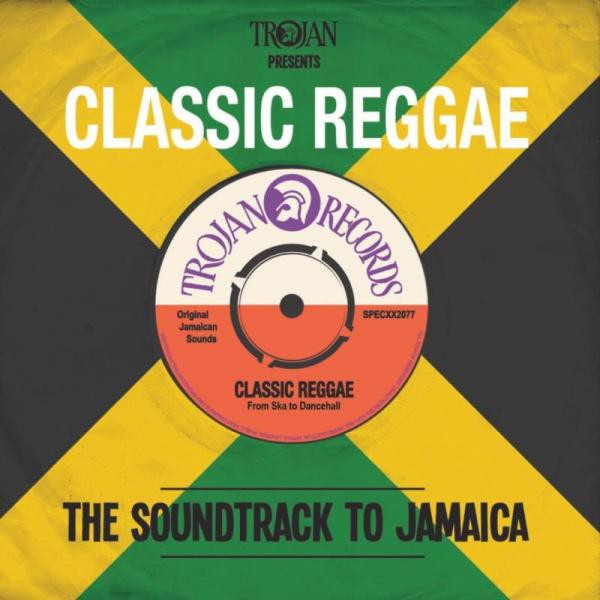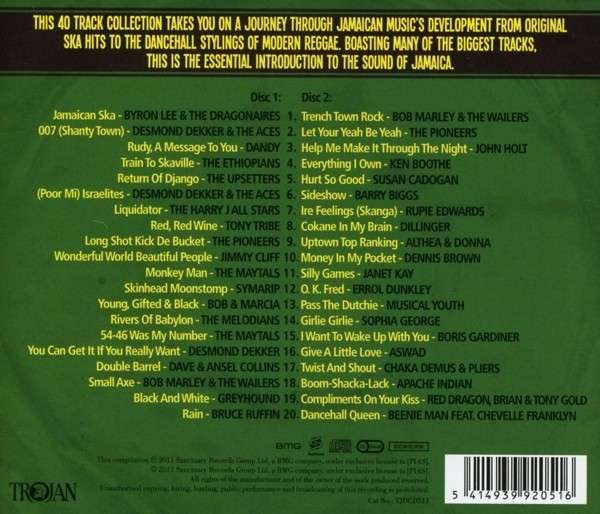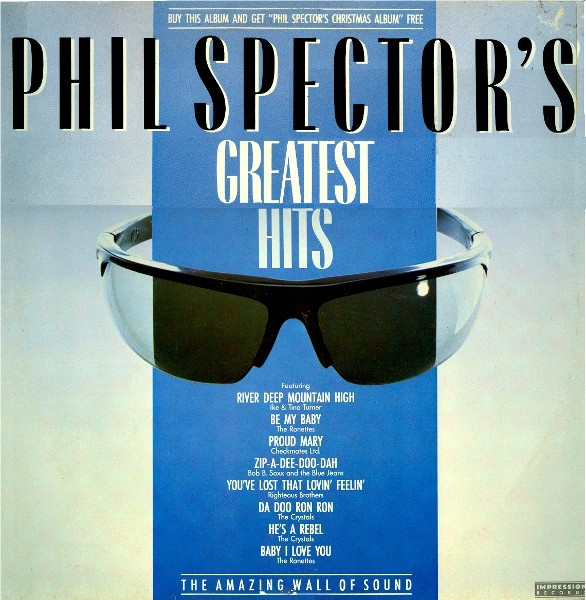Trojan Presents: Classic Reggae

There are certainly some fine collections in this series from the legendary Jamaican Trojan label but this is arguably the best, functioning as a sort of compressed, bite-size history of reggae itself. It also has remastered its many classic cuts outstandingly well.
Let's look at what's on offer -
Disc One
The collection kicks off by including an original ska number in Byron Lee & The Dragonaires' joyful Jamaica Ska. Ska was where it all began, of course, before the rock steady rude boys came along....
Desmond Dekker & The Aces' 007 (Shanty Town) is Rude Boy Heaven. The song became a hit in the UK. Its James Bond/007 message is unclear, he is only mentioned in one line, but the rest of the song would seem to be another anti-Rude Boy condemnation. "Rude Boy him a weep and a-wail". Continuing the rude boy theme, Dandy recorded the original of A Message To You Rudy, memorably covered by The Specials. Rico Rodriguez, who played on The Specials' version, also contributes a wonderful trombone backing on this original version.
By the release of The Ethiopians' Train To Skaville in 1967 did you think Ska was totally finished? Then think again, because in 1967 there was still time for The Ethiopians to merge Ska with Rocksteady and a deep reggae groove, appropriating the Ring Of Fire riff used on Don Drummond and Tommy McCook's (Music Is My) Occupation once more, to great effect. Often, when reggae compilations are compiled, they start with this one, alongside Lord Tanamo's I'm In The Mood For Ska.
Return Of Django by The Upsetters, featuring Lee "Scratch" Perry is a Rocksteady/Skinhead skank that utilised lots of Ska-style saxophone. The instrumental number as it all - Ska/Rocksteady/Skinhead. It is now revered as a classic of its era and appears on pretty much every reggae compilation. It was a hit in the UK.
A true classic now, in Desmond Dekker & The Aces' Israelites. It's 1968 now and reggae was about to explode into our consciousness due to one song. What an opening line it had in the briefly unaccompanied "Get up in the morning and slave for breads, sir". Israelites was the first reggae song I ever heard and, at ten years old, I knew this type of music excited me so much and I wanted as much of it as I could get.
The intro to Harry J & The Allstars' Liquidator was sampled by The Staple Singers on the hit I'll Take You There, this was a true skinhead classic and, true to their skinhead/suedehead history, it is still played just before kick off at Chelsea FC fixtures. It is one of the great instrumental hits, and its organ lines are straight out of the Booker T. & The MGs playbook, aren't they?
Tony Tribe's Red, Red Wine was a Neil Diamond song, this Skinhead stomping number was produced by Dandy "Suzanne Beware Of The Devil" Livingstone and is latterly known to pretty much everyone as a huge number one hit for UB40 in the autumn of 1983, a time I remember as if it were yesterday. A sad romantic song, Tony Tribe's version has an evocative, moving vibe to it.The Pioneers' Longshot Kick De Bucket is another classic of its era and one covered once more by The Specials. It was a tale of a racehorse who, inconsiderately, died, preventing the singer collecting any winnings on his bet. West Indians are traditionally big horse racing fans. It is a wonderful, evocative Skinhead stomper. The songs we are listening to at this point in the collection are still possessing a raw, unadulterated Jamaican sound, but things were about to change....
Jimmy Cliff's Wonderful World, Beautiful People was the first reggae number (certainly the first on this collection) to utilise those pop sensibility-aimed sweeping strings. They were the brainchild of Island Records' Chris Blackwell. Some say he took the Africa soul out of reggae and he agreed, but he also said that he made reggae "respectable" and took it into the UK charts on an unprecedented scale. Personally, I grew up with these enhanced reggae sounds, so I will always have time for them, but I understand the contrasting opinions they generate.
Proper classic skinhead stomping here in Toots & The Maytals' Monkey Man. One of my favourite reggae numbers from the period, indeed of all time. It was covered by the Specials in their debt album in 1979. Toots commands the vocals in that glorious preacher fashion once more. Talking of skinhead reggae, get your boots on for Symarip's Skinhead Moonstomp. Why, there were even skinheads on the moon.
With Bob & Marcia's Young, Gifted And Black the killers just keep on coming, don't they? What a truly fertile period this was for reggae! I love this song partly for its sheer nostalgia. It is always dedicated by me to the young black boys I played football with in the early seventies. I still can see them now, always nicknamed "Pele" or "Eusebio".
Like Red Red Wine, The Melodians' Rivers Of Babylon was another song known for its big hit status for a different artist (in this case Boney M), The Melodians take Psalm 37 and give it a wonderful, devotional skank. Come on all you skinheads, get the good book out.
Toots Hibbert used his churchy, gospelly voice to great effect on 54-46 (That's My Number) and his ability to make a studio recording sound like an ad hoc live recording comes across loud and clear. The record is raw and edgy, Toots delivering sermon like a wired-up preacher. "Give it to me one time.....".
From the iconic The Harder They Come soundtrack comes You Can Get It If You Really Want by Desmond Dekker. The gems just don't stop. This is the skanking, non-strings Jamaican original. Don't you love those trumpet breaks too? This is up there in the top ten greatest reggae hits of all time, surely?
Dave & Ansel Collins' Double Barrel was a massive number one hit in the UK in the summer of 1971, this marvellous, evocative semi-instrumental collaboration between Dave & Ansel and Sly Dunbar and Robbie Shakespeare was another track that sealed my love of reggae. I loved the vocal pronouncements - "I am the magnificent W.O.O." etc etc. So many people I knew got into reggae as a result of this single.
A first appearance for Bob Marley & The Wailers with Small Axe, a classic early Marley cut. It drips with early roots attitude - a melodic, infectious, dignified one, though. Marley's sharp vocal and those brass interjections make this stand out as the work of an artist who definitely had something.
Greyhound's Black And White was another of those notable summer of 1971 UK chart hits for reggae. There were just so many of them. They are not all included on here. The summer of 1971 in the UK was, in so many ways, the summer of pop reggae. The song was string-augmented, of course, and was a heart in the right place plea for racial unity, from childhood onwards. Once more, it takes me right back to 1971. How I loved these singles.
Bruce Ruffin (no relation to Motown's Jimmy and David, by the way) ended this collection's period of pop reggae (almost) with the catchy and slightly mysterious cover of José Feliciano's Rain.
Disc Two
Bob Marley & The Wailers' vibrant Trenchtown Rock was an early big Jamaican hit for Marley and, although Marley aways claimed that it was a militant diatribe against the police, it has long been interpreted as a song about the redemptive power of music. Indeed, it is quoted on the main page of this very blog, under the blog's title - "one good thing about music - when it hits you feel no pain". Quite. The song also provided a rosing opener to Marley's legendary 1975 live album.
With The Pioneers' Let Your Yeah Be Yeah we briefly return to the manufactured sound of string-enhanced reggae that has The Pioneers sounding so different to how they had sounded on Longshot Kick The Bucket. This poppy number was a chart hit, not surprisingly. It is pretty irresistible. Even the brass breaks sound light and poppy.
John Holt's lilting, skanking cover of Kris Kristofferson/Gladys Knight & The Pips' Help Me Make It Through The Night is another one that is just so nostalgic for me as indeed is Ken Boothe's cover of Bread's Everything I Own which gave reggae a huge number one in the autumn of 1974.
Susan Cadogan's Hurt So Good is a sexy but lively mid0-seventies reggae hit, produced by Lee "Scratch" Perry. It's another one that instantly takes me right back. Guess what? the same applies to Barry Biggs' cover of Blue Magic's catchy Sideshow.
Now, big changes were afoot. First up, it's Rupie Edwards' ground-breaking first chart hit for dub riddims in Ire Feelings (Skanga). It was considered to be decidedly weird at the time, in 1974-75, but boy, did it catch on and, soon, dub and roots would be everywhere.....
Things had properly changed now, Everything I Own and Hurt So Good being the last true reggae-lite hits, and roots/DJ cuts were now de rigeur, showcased by Dillinger's nonsensical dubby chant, Cocaine In My Brain.
Two Jamaica girls called Althea & Donna took roots to the top of the UK charts in 1977-78 with their infectious roots-pop number Uptown Top Ranking.
Dennis Brown's Money In My Pocket originally dated from 1973, but it as re-recorded and given a more poppy makeover in 1978 and was a big hit. Reggae could still score chart hits and the sub-genre of Lovers Rock had one in the infectious high-voiced dance-ish party number Silly Games by Janet Kay.A new commerciality seemed to be arriving for reggae, with essentially roots material being given a pop sheen to guarantee chart positions. Such examples are Errol Dunkley's OK Fred, child band Musical Youth's cover of Pass The Dutchie (adapted from The Mighty Diamonds' Pass The Koutchie) and Sophia George's irresistible Girlie Girlie. All are remembered affectionately as fine chart hits.
That trend is continued with the Lovers Rock of Boris Gardner's I Want To Wake Up With You and former roots band Aswad's poppy Give A Little Love.
The final four tracks are commercial songs from the Ragga and Dancehall sub-genres - Chaka Demus & Pliers appropriation of Twist And Shout, Apace Indian's similar "version" of Hopeton Lewis' Boom Shacka Lack, Red Dragon's Compliments On Your Kiss and Beenie Man's Dancehall Queen.
With a few exceptions, of course, this is a fair "chart reggae in your pocket" overview. One of the best around.









